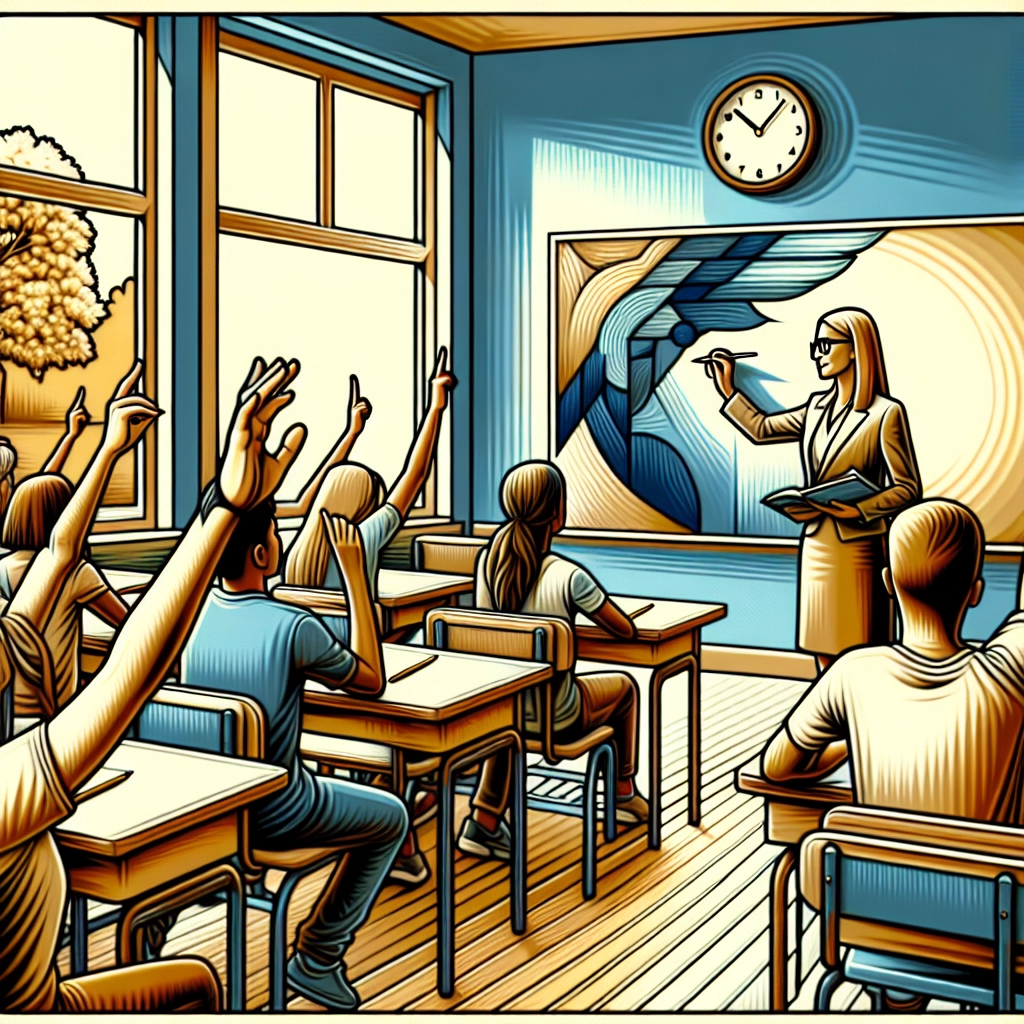Importance Of Student Feedback For Teachers: A Crucial Evaluation Tool


Student feedback is the information provided by students about their learning experiences, including the quality of teaching, learning environment, and their own comprehension. It is important for teachers as it helps them understand the effectiveness of their teaching methods, make improvements, and tailor their approach to better meet the needs of their students.
Gathering student feedback allows teachers to make informed decisions and continuously improve their teaching practices.
Check out this Youtube video: “Student Feedback: Effective Strategies & Tips” for valuable insights on the importance of student feedback for teachers and practical tips on how to effectively gather and utilize it.
The Benefits of Student Feedback
Promotes a student-centered approach to learning
Student feedback promotes a student-centered approach to learning by empowering students to take an active role in their education. When students are encouraged to provide feedback, they feel heard and valued, leading to a more engaging learning environment.
This approach shifts the focus from teacher-led instruction to a more balanced, interactive learning experience, where students’ voices and opinions are considered in shaping the educational journey.
Helps teachers understand students’ learning needs and preferences
Student feedback serves as a window into students’ learning needs and preferences, providing valuable insights for teachers. By understanding how students learn best and what they struggle with, teachers can tailor their teaching methods to cater to individual learning styles.
For example, if students express a preference for visual learning, teachers can incorporate more visual aids into their lessons to enhance comprehension and engagement. This creates a more personalized and effective learning experience for students.
Encourages self-reflection and professional growth for teachers
Embracing student feedback encourages self-reflection and professional growth for teachers. By receiving input directly from students, teachers gain a deeper understanding of their own strengths and areas for improvement.
This feedback loop fosters a culture of continuous improvement, prompting educators to refine their teaching practices and seek professional development opportunities to better meet students’ needs. This leads to heightened teacher efficacy and improved student outcomes.
Fosters a positive and collaborative classroom environment
Utilizing student feedback fosters a positive and collaborative classroom environment where open communication and mutual respect thrive. When students feel their feedback is valued, they are more likely to actively participate and engage in classroom discussions.
This collaborative atmosphere nurtures a sense of community and teamwork, creating a supportive space for learning and growth. Additionally, it cultivates a culture of trust between students and teachers, promoting a more enriching and inclusive educational experience.
| Student Feedback Benefits | Description |
|---|---|
| Student-centered learning approach | Empowers students to take an active role in their education, leading to a more engaging environment. |
| Understanding diverse learning needs | Provides insights to tailor teaching methods for different learning styles, enhancing comprehension. |
| Encourages self-reflection and growth | Promotes a culture of continuous improvement for teachers, resulting in heightened teacher efficacy. |
| Fosters positive classroom environment | Cultivates an inclusive and collaborative atmosphere, leading to a more enriching educational experience. |
In essence, student feedback significantly impacts the educational landscape by promoting a student-centered approach, aiding teacher understanding of diverse learning needs, encouraging professional growth, and fostering a positive classroom environment. This symbiotic relationship between feedback and improvement underscores the importance of embracing the perspectives of students in shaping a dynamic and effective learning environment.
The Role of Student Feedback in Teacher Evaluation
How student feedback contributes to teacher evaluations
Student feedback plays a crucial role in teacher evaluations by providing valuable insights into the effectiveness of teaching methods and the overall classroom experience. It allows educators to gain a deeper understanding of their impact on students’ learning, enabling them to make real-time adjustments to their instructional techniques.
By actively collecting and analyzing student feedback, teachers can adapt their approaches to better cater to the diverse learning styles and needs of their students, fostering an environment conducive to effective knowledge transfer.
The impact of student feedback on teacher effectiveness
The impact of student feedback on teacher effectiveness cannot be overstated. It serves as a direct mechanism for continuous improvement, enabling educators to identify areas for growth and refinement in their instructional practices.
By embracing constructive criticism and positive reinforcement from students, teachers can enhance their pedagogical skills, creating a more engaging and impactful learning experience. Additionally, student feedback fosters a sense of accountability and responsiveness in educators, driving them to strive for excellence in their teaching methods and approaches.
The importance of incorporating student feedback into performance assessments
Incorporating student feedback into performance assessments is paramount for fostering a culture of accountability and continuous improvement in the educational landscape. The authentic perspective offered by students empowers teachers to leverage their strengths and address areas of improvement, enhancing the overall quality of education delivery.
By integrating student feedback into performance assessments, educational institutions can ensure that the evaluation process remains holistic and reflective of the actual impact of teaching practices on student learning outcomes. This inclusive approach fosters a collaborative environment where the collective voice of students contributes to the ongoing enhancement of educational standards.
| Benefits of Student Feedback in Teacher Evaluation |
|---|
| 1. Provides authentic insight into teaching effectiveness |
| 2. Enhances pedagogical practices through constructive criticism |
| 3. Fosters a culture of accountability and continuous improvement |
| 4. Contributes to a holistic and inclusive performance assessment approach |
Ways to Collect Student Feedback
Traditional methods such as surveys and questionnaires
One of the traditional methods for collecting student feedback is through surveys and questionnaires. These can be distributed during or after a course to gather insights on the learning experience, teaching effectiveness, and overall satisfaction.
Utilizing technology for gathering anonymous feedback
Utilizing technology for gathering anonymous feedback has become increasingly popular. Platforms like Qualtrics and Google Forms allow teachers to create anonymous surveys, providing students with a comfortable space to express their opinions without the fear of judgment or bias.
Incorporating peer evaluations and classroom discussions
Incorporating peer evaluations and classroom discussions encourages students to engage directly with their peers, fostering a collaborative learning environment. Peer evaluations offer valuable insights into individual and group performances, while classroom discussions provide an open forum for students to voice their opinions and concerns.
Strategies for Implementing Student Feedback
Creating a safe and supportive feedback culture in the classroom
To create a safe and supportive feedback culture in the classroom, teachers should foster an environment where students feel comfortable expressing their thoughts and opinions. Encouraging open discussions, showing appreciation for diverse perspectives, and actively listening to student feedback are essential for building a positive feedback culture.
Training teachers on how to interpret and apply student feedback
Training teachers on how to interpret and apply student feedback involves equipping them with the skills to understand the underlying messages in student feedback. Teachers should be trained to recognize patterns, identify areas for improvement, and leverage student feedback to adapt their teaching methods effectively.
Using feedback data to make actionable improvements in teaching methods
Using feedback data to make actionable improvements in teaching methods requires a systematic approach to analyze and implement changes based on the feedback received. Teachers can use data-driven insights from student feedback to tailor their instructional strategies, introduce new learning materials, or adjust their approach to better meet their students’ needs.
The Importance of Timely Feedback
Discussing the significance of timely feedback for teachers
Timely feedback for teachers is crucial as it allows them to adjust their teaching methods in real-time, ensuring that students are grasping the material effectively. This immediate insight into student comprehension empowers teachers to make necessary adaptations, ultimately enhancing the learning experience.
The impact of immediate feedback on student-teacher relationships
Immediate feedback not only fosters a more dynamic and engaging learning environment but also strengthens the bond between students and teachers. It creates a sense of trust and support, showing students that their progress truly matters and that there is a genuine investment in their success.
How to ensure the prompt delivery and response to student feedback
To ensure prompt delivery and response to student feedback, teachers can implement technology tools that streamline the feedback process, such as digital platforms for submitting and reviewing assignments. Additionally, establishing a structured feedback schedule and clear communication channels can facilitate efficient responses to student input.
Overcoming Challenges in Utilizing Student Feedback
Addressing concerns about the validity and reliability of student feedback
Ensuring the validity and reliability of student feedback involves establishing clear assessment criteria, fostering a culture of constructive feedback, and cross-referencing with other forms of assessment such as peer reviews. By setting specific objectives for the feedback and providing standardized assessment tools, teachers can mitigate concerns surrounding the accuracy and credibility of student input.
Dealing with potential conflicts or biases in student feedback
Addressing conflicts or biases in student feedback can be achieved through promoting open dialogues, actively listening to students’ perspectives, and implementing strategies to reduce bias, such as blind marking and reflective feedback practices. Additionally, seeking feedback on the assessment process itself and encouraging peer evaluation can help identify and address potential biases, ensuring a fair and balanced feedback system.
Strategies for minimizing the impact of unconstructive or irrelevant feedback
To minimize the impact of unconstructive or irrelevant feedback, teachers can emphasize specific guidelines for constructive criticism, providing training on effective feedback delivery, and encouraging students to focus on actionable suggestions. Implementing a feedback moderation system and utilizing research-based tips for giving meaningful feedback can further help in filtering out unconstructive input, ensuring that the feedback received is valuable and relevant to the learning process.
Incorporating Student Feedback into Professional Development
Utilizing student feedback as a tool for ongoing professional growth
Student feedback is crucial for the ongoing professional growth of teachers. It provides valuable insights into the effectiveness of teaching methods, allowing educators to make real-time adjustments to meet the diverse needs of their students.
By actively engaging with student feedback, teachers can refine their practices, enhance classroom experiences, and foster a more supportive learning environment. Incorporating student feedback into the teaching process creates a collaborative relationship that empowers students to take ownership of their education, ultimately leading to improved academic outcomes.
How to integrate student feedback into teacher training programs
To integrate student feedback into teacher training programs, it is essential to create structured mechanisms for collecting and actioning feedback. This can include end-of-year surveys, one-on-one discussions, anonymous feedback forms, or quick, informal questionnaires such as “exit tickets”.
Teachers should also adopt an open-doors/open-ears policy, encouraging regular feedback from students during the course, which allows for real-time adjustments to teaching methods. Furthermore, teacher training sessions could include simulations or role-plays where teachers can apply student feedback to improve their pedagogical approach.
The long-term benefits of using student feedback in professional development
The long-term benefits of using student feedback in professional development extend beyond immediate classroom improvements. Through ongoing engagement with student feedback, teachers cultivate a culture of continuous improvement and self-reflection, enhancing their professional practice.
Furthermore, it fosters a sense of trust and collaboration with students, leading to a more positive and inclusive learning environment. By incorporating student feedback into professional development, teachers can tailor their instructional methods to suit the individual learning needs of their students, ultimately contributing to better academic performance and overall student satisfaction.
Fostering Open Communication through Student Feedback
Encouraging students to communicate openly and honestly
Understanding the importance of student feedback for teachers is crucial in encouraging students to communicate openly and honestly. When students feel that their feedback is valued and acted upon, they are more likely to express their thoughts and concerns openly.
For example, by actively seeking feedback on classroom activities or the teaching approach, teachers create an environment where students feel comfortable sharing their opinions without fear of judgment.
Building trust and rapport through the exchange of feedback
One of the critical aspects of the importance of student feedback for teachers is the opportunity to build trust and rapport through the exchange of feedback. When teachers actively listen and respond to student feedback, it fosters a sense of trust and understanding.
For instance, by acknowledging and acting upon student suggestions, teachers create a collaborative environment where students feel valued and respected, leading to stronger teacher-student relationships.
Creating a culture of mutual respect and understanding in the classroom
The importance of student feedback for teachers is evident in creating a culture of mutual respect and understanding in the classroom. By actively involving students in the feedback process, teachers demonstrate respect for their perspectives and opinions.
This leads to a classroom environment where students feel empowered to share their thoughts, contributing to a culture of mutual respect and understanding among all stakeholders.
The Ethical Considerations of Student Feedback
Maintaining confidentiality and anonymity in feedback processes
It is essential to maintain confidentiality and anonymity in the student feedback process to ensure the protection of students’ identities and promote honesty in their responses. Implementing anonymous feedback forms and secure data storage systems can help uphold confidentiality and anonymity.
Ensuring the ethical use of student feedback for teacher improvement
Ethical use of student feedback for teacher improvement involves empowering teachers to select the method of feedback and areas of improvement, ensuring that feedback results are used to inform and celebrate achievements, and allowing instructors to control all improvement activities. This approach ensures fairness and respect for the teachers’ professional growth.
Addressing potential ethical dilemmas related to student-teacher feedback
In addressing potential ethical dilemmas related to student-teacher feedback, it is crucial to recognize specific issues raised, understand their consequences, and generate alternative solutions. Moreover, fostering open dialogue around teaching and learning, using feedback to enhance teaching methodologies, and providing continuous development opportunities for educators are integral in resolving ethical dilemmas with student-teacher feedback.
Leveraging Student Feedback for Student Success
The correlation between teacher improvement and student achievement
Research indicates that there is a significant positive correlation between teacher improvement and student achievement. A study found that teacher effectiveness scores were moderately related to student achievement.
The learning environment, particularly effective communication, demonstrated the highest relationship with student achievement in English and Mathematics. This highlights the crucial role teachers play in enhancing student success.
How student feedback contributes to personalized learning experiences
Student feedback plays a pivotal role in personalized learning experiences. It provides teachers with valuable insights into students’ needs, interests, and learning styles.
By understanding their students’ strengths and weaknesses through feedback, teachers can tailor instruction to meet individual needs. This personalized approach fosters a deeper understanding of the students, contributing to improved academic performance.
The holistic impact of utilizing student feedback on overall academic performance
Utilizing student feedback has a holistic impact on overall academic performance. It empowers students to express their opinions and concerns, creating a collaborative learning environment.
Furthermore, meaningful feedback has been associated with positive learning outcomes and higher academic achievement. By leveraging student feedback effectively, teachers can enhance the overall academic performance of their students.
Best Practices for Analyzing and Utilizing Student Feedback
Techniques for analyzing qualitative and quantitative feedback data
When it comes to analyzing qualitative feedback, techniques such as content analysis, thematic analysis, narrative analysis, grounded theory analysis, and discourse analysis prove to be invaluable. These methods help in identifying recurring themes, patterns, and underlying narratives within the qualitative feedback provided by students.
On the other hand, for quantitative feedback, data analysis methods like defining research questions, collecting qualitative data, and ensuring high-quality data collection play a crucial role in comprehensively understanding student perspectives.
Strategies for identifying actionable insights from student feedback
To derive actionable insights from student feedback, it is essential to be as specific as possible when reviewing the information. Providing learners with detailed, specific information about what they are doing right or wrong can help in identifying actionable strategies.
Moreover, creating space between the raw student feedback and the actionable tasks, inviting feedback on received feedback, and conducting comprehensive analysis can aid in deriving meaningful, actionable insights from student feedback.
Implementing changes based on student feedback to enhance the learning experience
Implementing changes based on student feedback requires continuous refinement of teaching practices. Encouraging students to offer relevant, constructive feedback, dedicating time to closing the loop with students, and strategically addressing and implementing changes based on the feedback received can significantly enhance the overall learning experience.
This can create a positive, respectful environment and contribute to student success. Furthermore, continuously refining practice with the help of student feedback can lead to a philosophy of continuous improvement, ultimately ensuring an enriched learning experience for students.
Case Studies and Examples of Successful Implementation
Real-life examples of schools or educators effectively utilizing student feedback
One remarkable example is that of Springville High School, where teachers actively incorporate student feedback into their lesson planning. They regularly conduct open discussions with students to gather insights and adapt their teaching methods to cater to individual learning styles.
This approach has led to a significant improvement in student engagement and academic performance.
Demonstrating the positive outcomes of integrating student feedback into teaching practices
At Smithson Elementary, teachers have integrated student feedback into their teaching practices by implementing a “feedback corner” where students can anonymously share their thoughts and suggestions. As a result, teachers have been able to address specific areas of improvement, leading to a notable increase in student satisfaction and enthusiasm for learning.
Highlighting the transformative impact of student feedback on teacher performance
Grove High School exemplifies the transformative impact of student feedback on teacher performance. By actively seeking and implementing student feedback, teachers have reported a heightened sense of empathy towards their students’ needs and an improved ability to adapt their teaching methods.
This has resulted in a more positive and productive learning environment for both teachers and students.
Addressing Counterarguments and Misconceptions
| Student Feedback Misconception | Contradictory Fact |
|---|---|
| Misconception 1: Feedback is One-Sided | In reality, feedback involves active participation from both the teacher and the students, fostering a collaborative learning environment. |
| Misconception 2: Students’ Feedback is Not Valuable | On the contrary, soliciting feedback from students offers valuable insights into the effectiveness of teaching methods and classroom dynamics, leading to continuous improvement. |
Common misconceptions about the value of student feedback for teachers
Feedback is often misunderstood as a unilateral process where only teachers provide insights. In contrast, it’s a collaborative endeavor involving active participation from both teachers and students, fostering a culture of shared responsibility for learning outcomes.
Additionally, there’s a prevailing notion that students’ feedback lacks value. However, when harnessed effectively, it offers crucial insights into the effectiveness of teaching practices and the learning environment, driving continuous improvement.
Addressing potential criticism or skepticism regarding student feedback
Criticism often arises regarding the authenticity and relevance of student feedback. However, establishing clear guidelines and frameworks for collecting and analyzing student feedback can address these concerns.
By ensuring structured and objective evaluation mechanisms, the credibility and reliability of student feedback can be underscored, mitigating skepticism and enhancing its utility for teachers’ professional development.
Providing evidence-based arguments to support the importance of student feedback
Numerous studies have showcased the tangible benefits of integrating student feedback into the teaching process. For instance, research has highlighted how soliciting feedback empowers teachers to adapt their methods, providing tailor-made approaches that resonate with students’ learning needs.
Moreover, leveraging student feedback fosters a culture of inclusivity, where students feel valued and heard, ultimately enhancing engagement and overall academic performance.
In essence, clarifying these misconceptions and addressing skepticism regarding student feedback is crucial in recognizing its transformative potential. By harnessing this invaluable resource, teachers can adapt their approaches, foster inclusive learning environments, and cultivate stronger student-teacher partnerships, ultimately elevating the quality of education.
The Future of Student Feedback in Education
Exploring potential advancements in technology for student feedback collection
Technology has the potential to revolutionize student feedback collection by introducing interactive platforms that allow real-time feedback. For instance, digital surveys and anonymous online feedback forms can provide students with a comfortable medium to express their opinions.
Additionally, innovative tools such as AI-powered systems can analyze feedback patterns and offer insights into student sentiment and academic needs, enabling educators to make data-driven adjustments.
How student feedback can continue to shape the future of education
Student feedback serves as a compass guiding educational practices towards enhanced engagement, inclusivity, and personalized learning experiences. By actively involving students in the feedback process, educators can tailor their teaching methods to address individual needs and foster an environment of continuous improvement.
This collaborative approach not only empowers students but also cultivates a culture of responsiveness within educational institutions, nurturing a dynamic and adaptive learning ecosystem.
Predicting the long-term impact of student feedback on educational practices
In the long run, student feedback has the potential to catalyze fundamental shifts in educational practices, emphasizing a learner-centric approach. By harnessing insights from student feedback, educators can refine curriculum design, teaching methodologies, and assessment strategies to align with evolving student expectations and diverse learning styles.
This evolution towards a more student-centered model can elevate overall academic quality, responsiveness, and relevance, ensuring that educational practices remain attuned to societal and technological advancements.
Recommended Amazon Products for Leveraging Student Feedback for Student Success
Here’s a curated list of products that can help teachers leverage student feedback for student success with ease. These recommendations are based on the importance of fostering open communication and creating a collaborative classroom environment.
Survey and Feedback Collection Tools
There are various tools available on Amazon to facilitate the collection of student feedback, such as the “Student Feedback Survey Kit.” This kit includes a range of survey templates and tools designed specifically for gathering feedback from students, making it easier for teachers to gain valuable insights into their students’ learning experiences.
Pros and Cons
| Pros | Cons |
|---|---|
| Easy to use and customize | Limited to survey-based feedback |
| Provides structured feedback data | May require additional tech skills for customization |
| Saves time in feedback collection | May not capture nuanced feedback effectively |
Voice Amplification System
A voice amplification system like the “VoiceBooster Voice Amplifier” enables teachers to ensure that they are heard clearly by all students, promoting open communication and active feedback exchange in the classroom.
Pros and Cons
| Pros | Cons |
|---|---|
| Improves classroom communication | Requires additional setup and maintenance |
| Enhances teacher-student interaction | Initial learning curve for operation |
| Helps in fostering a collaborative environment |
Digital Voice Recorder
Digital voice recorders, such as the “Sony ICD-UX570 Digital Voice Recorder,” allow teachers to capture in-depth verbal feedback from students during classroom discussions, ensuring that no valuable insights are overlooked.
Pros and Cons
| Pros | Cons |
|---|---|
| Captures detailed verbal feedback | Requires management of recorded data |
| Facilitates transcribing feedback | May need policies for privacy and storage |
| Provides authentic student voice |
Inclusive Seating Options
Inclusive seating options, like the “Kore Wobble Chair,” support a student-centered approach to learning by allowing students to move and engage comfortably, encouraging them to provide more candid and reflective feedback.
Pros and Cons
| Pros | Cons |
|---|---|
| Fosters student engagement and focus | Requires classroom arrangement considerations |
| Provides versatile and ergonomic seating | Initial adjustment period for students to adapt |
| Encourages open classroom dialogue | May not suit all classroom environments |
Ergonomic Document Camera
An ergonomic document camera, such as the “Ipevo V4K Ultra High Definition USB Document Camera,” empowers teachers to showcase students’ work to the entire class, encouraging reflection and peer evaluation.
Pros and Cons
| Pros | Cons |
|---|---|
| Facilitates peer assessment | Additional setup and space requirements |
| Enhances classroom visibility | May require technical proficiency for operation |
| Supports student-centered learning |
Top Recommended Product for Leveraging Student Feedback for Student Success
If you’re looking for the best solution for leveraging student feedback for student success, we highly recommend the “Student Feedback Survey Kit” on Amazon. This comprehensive kit includes various templates and tools for gathering feedback from students, helping teachers gain valuable insights.
Ready to improve student success through effective feedback collection? Check out the Student Feedback Survey Kit today for the best results!


Conclusion
Student feedback plays a critical role in helping teachers understand the effectiveness of their teaching methods and the overall learning experience of their students. By listening to and taking into account student feedback, teachers can make necessary adjustments to their teaching strategies, ultimately leading to improved student engagement and academic performance.
Furthermore, the enduring significance of student feedback cannot be overstated, as it directly contributes to driving positive educational outcomes. When teachers actively seek and utilize student feedback, it creates a supportive and collaborative learning environment, fostering a sense of ownership and responsibility among students.
This, in turn, leads to increased motivation and a more successful learning experience for everyone involved.
The importance of student feedback for teachers lies in its ability to create a feedback loop that continually improves the learning environment. By taking student feedback seriously, teachers can gain valuable insights into the effectiveness of their instructional methods, leading to a more fulfilling and beneficial educational experience for both students and teachers alike.

















